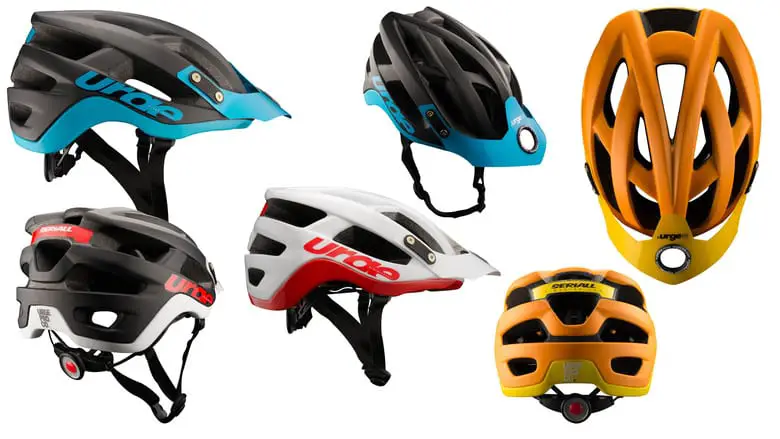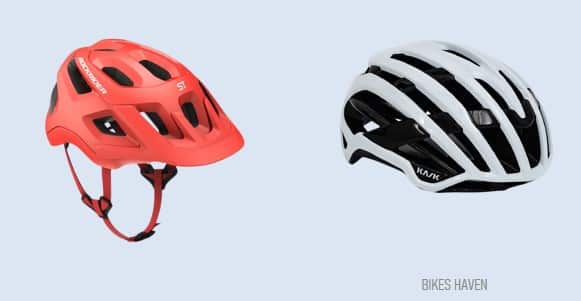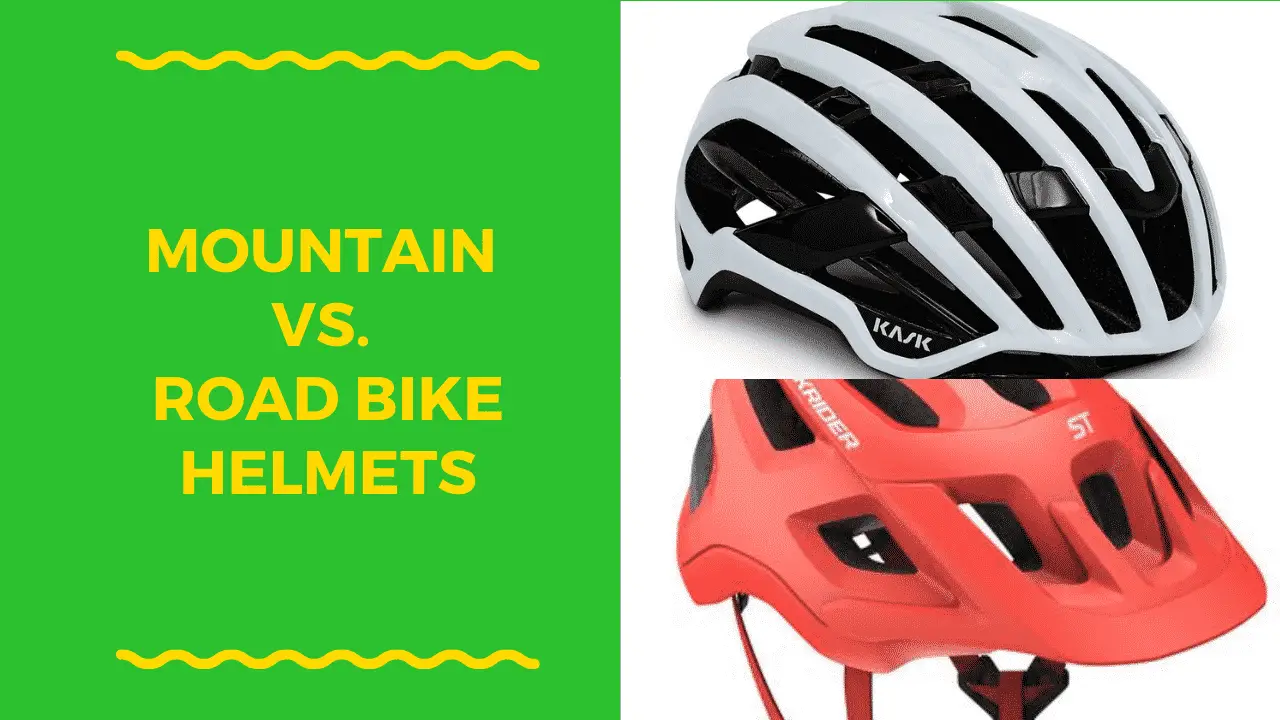You already know the obvious. A bike helmet is the most important accessory that you, a cyclist, must own.
Even studies, like this one, suggest that the device can save lives by lowering head injuries in the event of an impact.
To speak from a personal experience, I’ve benefited from my Giro bike helmet on two different occasions.
Otherwise, I’d probably be disabled somehow or not alive to write this article.
One of the frequently asked questions that I’ve seen many cyclists ask about helmets is whether a helmet designed for mountain bike is suitable for road cycling.
Or is it better to stick to a road bike helmet instead if you own a road bike?
The short answer is yes, you can use a mountain bike helmet for road biking. But it’s not the ideal thing to do.
It’s a safe bet to say that you should have a helmet on your head than none at all. So, at times, wearing a mountain bike helmet for road cycling shouldn’t be a big deal.
Contents
Road vs Mountain Bike Helmets

I’d like you to pause for a second and ask yourself this question: why do manufacturers sell mountain bike helmets and road bike helmets separately?
Can’t they save on resources, time, and money if they made universal helmets instead?
Of course they would. But you need to remember that mountain biking is a different entity from road cycling. The helmets aren’t an exception at all.
We’ll get into more details in a few seconds. But for now, you have to note that mountain bike helmets aren’t effective for road biking, and vice versa.
What’s the Difference Between a Road Bike and Mountain Bike Helmet?
If a mountain bike helmet isn’t suitable for road cycling and vice versa, then there must be some difference between the two, right?
Mountain Bike Helmet | Road Bike Helmet |
|---|---|
Features beefy, protective design | Has a lightweight, aerodynamic design |
Includes a visor for maximum protection | A visor not includes, wear cycling sunglasses |
Built to tests all terrain limits | Built for fast cycling |
Difference in Design
A mountain bike riding session will take you to smooth and rough paths.
These strange and unknown terrains will get you moving up and down. Not to mention put you in some in the air moments.
Because manufacturers have taken note of this kind of motion, they design mountain bike helmets to securely fit on your head.
Perhaps one of the notable features of a mountain bike helmet is the visor.
Interestingly, the visor is some sort of a protection mechanism, as it shields your eyes from the direct sunlight and foreign object that would otherwise land on your eyes as you ride your bike.
Road bike helmets are different. They feature an aerodynamic design that allows a cyclist to go hard and ride fast.
To say the least, the helmet doesn’t feature a visor, and it doesn’t feature that many air vents that would otherwise slow you down.
The Difference in the Number of Vents and Airflow

You probably have never been keen enough to count the number of vents on a bike helmet.
Maybe you’ve never even asked yourself why some helmets have many vents while others have few.
Or maybe you don’t care provided you have a good helmet to wear to your next cycling adventure.
In my opinion, you should be concerned. Because the number of vents on a mountain bike helmet has never been similar to the number of vents on a mountain bike helmet.
Here’s why:
A mountain biker hardly ever rides at a high speed. They put in more work to beat the unfriendly terrains out there, particularly in the steep, mountainous regions.
They put every muscle to the test and build up a lot of sweat in the process.
If the sweat drips down to the eyes, it could cloud the rider’s vision and make it difficult for them to move forward. This explains why a mountain bike helmet has as many vents as possible.
Remember, the slow speed at which you ride a mountain bike, plus the fact that sweating is inevitable, means that the helmet you wear must have sufficient airflow to keep your head cool and dry.
Because mountain bike helmets have many air vents, the chances of sweat dripping into your eyes are zero. That’s because the vents enhance consistent and sufficient air passage, so there’s enough airflow to keep your head cool and dry.
The case is completely different when it comes to road cycling. Here, you are riding your bike at least 3 times faster than a mountain biker.
Given the top speed, your head cools and dries faster, even if you’re a cyclist who often sweats a lot. It’s the speed that explains why road bike helmets don’t have as many vents as mountain bike helmets do.
While many vents are fine for a mountain bike helmet, it’s not exactly so for a road bike’s model.
Too many and you’ll experience some sort of drag. And drag is not a good thing because it will definitely slow you down.
For the road bikers that love to hit the road faster, a drag in speed is nothing more than an enemy to the most outstanding cycling experience.
Are These Helmets in Any Way Similar?
The fact that bike helmets, regardless of the type, play the same role means that they have some similarities.
First, they’re cushioned for comfort, although the level of cushioning varies from brand to brand.
Second, both road and mountain bike helmets feature some kind of impact protection technology, which goes a long way to keep you safe in case you fall from your bike and your head hits a hard object- the most common technology being MIPS.
Also, they have straps for fastening the helmet around your neck, so that they stay in position no matter how fast you ride your kind of bike.
Conclusion
The bottom line is this:
It’s okay to use a mountain bike helmet for road cycling.
But if you can get yourself a road bike helmet, go with it instead. You’ll feel the difference and enjoy your cycling experience.

